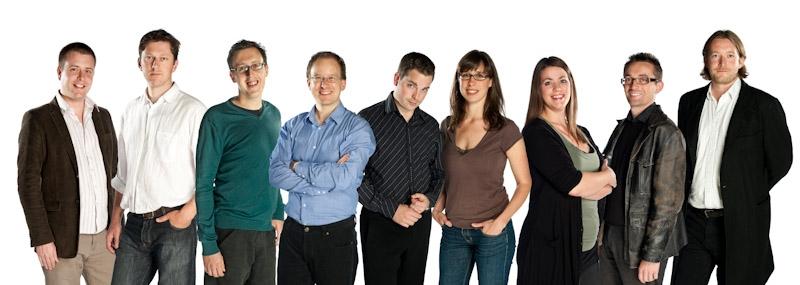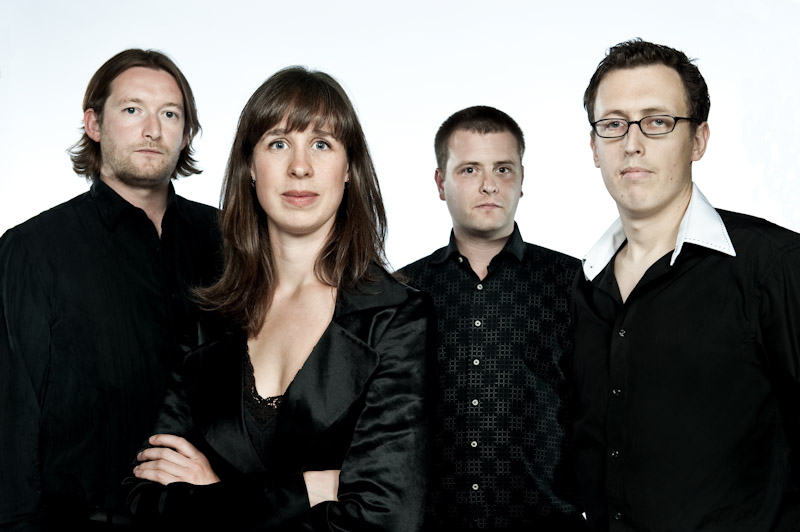Out Hear: Exaudi play John Cage Song Books, Kings Place | reviews, news & interviews
Out Hear: Exaudi play John Cage Song Books, Kings Place
Out Hear: Exaudi play John Cage Song Books, Kings Place
A deadpan performance to cleanse the mind and sharpen the senses

At its best, and most preposterous, John Cage's work can be a mind-cleanser. The overwhelmingly silly randomised conjunctions and ontological punning of the great Zen master of the 20th-century avant-garde can coax and trick you into letting go of categories and judgments, scale and expectation, and just letting yourself get swept along with the gloriously complex and profoundly nonsensical multidimensional parlour games.
The Song Books of 1970 have as much potential to overwhelm the faculties as anything in Cage's oeuvre, being a huge set of instructions in various forms from which musicians – operating independently of one another – can build up a collage of speech, action, sound and song, laced heavily with quotations from and allusions to the works of Henri Thoreau and Erik Satie. With “songs” which include preparing a salad, drinking brandy and playing a game of backgammon alongside recitations from Thoreau's journals, the piece is about bringing life being lived into the musical performance and, in theory, blurring the lines between life and performance.
 The Exaudi singers (pictured right), and electronic musicians from the University of East Anglia working with sound artist Bill Thompson, performed the Song Books entirely deadpan last night. Seated all around the audience, each with a stopwatch around their necks, the musicians stood up, sat down, untied and retied their shoelaces, paced across the auditorium, handed carefully wrapped packages of cranberries to audience members, and sang Thoreau's pastoral musings mostly with the seriousness of a consort performing religoius oratorios. With the smell of garlic crushed in a mortar to dress the salad (which was served in a bowl covered in mushroom designs, in a nice nod to Cage's mycological obsessions) filling the room, it felt as if the activity around us might build to something immersive and absorbing.
The Exaudi singers (pictured right), and electronic musicians from the University of East Anglia working with sound artist Bill Thompson, performed the Song Books entirely deadpan last night. Seated all around the audience, each with a stopwatch around their necks, the musicians stood up, sat down, untied and retied their shoelaces, paced across the auditorium, handed carefully wrapped packages of cranberries to audience members, and sang Thoreau's pastoral musings mostly with the seriousness of a consort performing religoius oratorios. With the smell of garlic crushed in a mortar to dress the salad (which was served in a bowl covered in mushroom designs, in a nice nod to Cage's mycological obsessions) filling the room, it felt as if the activity around us might build to something immersive and absorbing.
And on occasion it did. John Cage performances tend to demonstrate that there's no such thing as true randomness in human endeavour: however independently the performers may operate, there's no escaping the human facility for pattern recognition and amplification, and at the times when there was the most activity in the performance, with the performers utterly focused in on what they were doing, it felt more and more like a complex system operating as a whole. At these times, questions of meaning or meaninglessness became irrelevant, and it felt like being in a hive of alien activity - elegant, strange, occasionally disquieting but fascinating and oddly soothing. Even though the voices and electronic sounds being made may have created discord, it was a purposeful, living discord that felt good to be a part of.
At other times, though - all too often, in fact - a slight primness to the delivery made it feel like this was simply an abstracted recital rather than a subversion of the art/life boundary. As with an actor who "breaks the fourth wall", only to remind you even more strongly that you're all still in a theatre, it was often impossible to escape the fact that we were all sitting politely and quietly in rows, with these sounds and actions being delivered to us. And ultimately there was no real sense of unpredictability; even when one of the electronic musicians got up and walked out of the room, not returning even for the curtain calls, it barely merited a raised eyebrow. Given the myriad possibilities Cage's score offers, it would have been nice to be surprised more.
A Thoreau text repeated throughout by different singers stated "the best form of government is no government at all; that is the form we'll have when we are ready for it" - but this performance very rarely felt ungoverned or anarchic. Nevertheless, the performers' commitment and dry wit was in evidence throughout and the hour of pseudo-random activity was never boring; this is a hugely impressive achievement in itself. And even if it didn't leave us looking at the world completely afresh afterwards, we certainly felt our senses a little sharpened, our sensitivity to the mesh of human and natural activity a little greater, as we walked out into the King's Cross evening - a mixed blessing, some might say, but it's more than you take away from many evenings out.
Explore topics
Share this article
The future of Arts Journalism
You can stop theartsdesk.com closing!
We urgently need financing to survive. Our fundraising drive has thus far raised £49,000 but we need to reach £100,000 or we will be forced to close. Please contribute here: https://gofund.me/c3f6033d
And if you can forward this information to anyone who might assist, we’d be grateful.

Subscribe to theartsdesk.com
Thank you for continuing to read our work on theartsdesk.com. For unlimited access to every article in its entirety, including our archive of more than 15,000 pieces, we're asking for £5 per month or £40 per year. We feel it's a very good deal, and hope you do too.
To take a subscription now simply click here.
And if you're looking for that extra gift for a friend or family member, why not treat them to a theartsdesk.com gift subscription?
more New music
 Solar Eyes, Hare & Hounds, Birmingham review - local lads lay down some new tunes for a home crowd
Psychedelic indie dance music marinated in swirling dry ice
Solar Eyes, Hare & Hounds, Birmingham review - local lads lay down some new tunes for a home crowd
Psychedelic indie dance music marinated in swirling dry ice
 The Lemonheads' 'Love Chant' is a fine return to form
Evan Dando finally gets back in the saddle with an album of new tunes
The Lemonheads' 'Love Chant' is a fine return to form
Evan Dando finally gets back in the saddle with an album of new tunes
 Music Reissues Weekly: Evie Sands - I Can’t Let Go
Diligent, treasure-packed tribute to one of Sixties’ America’s great vocal stylists
Music Reissues Weekly: Evie Sands - I Can’t Let Go
Diligent, treasure-packed tribute to one of Sixties’ America’s great vocal stylists
 'Deadbeat': Tame Impala's downbeat rave-inspired latest
Fifth album from Australian project grooves but falls flat
'Deadbeat': Tame Impala's downbeat rave-inspired latest
Fifth album from Australian project grooves but falls flat
 Heartbreak and soaring beauty on Chrissie Hynde & Pals' Duets Special
The great Pretender at her most romantic and on the form of her life
Heartbreak and soaring beauty on Chrissie Hynde & Pals' Duets Special
The great Pretender at her most romantic and on the form of her life
 The Last Dinner Party's 'From the Pyre' is as enjoyable as it is over-the-top
Musically sophisticated five-piece ramp up the excesses but remain contagiously pop
The Last Dinner Party's 'From the Pyre' is as enjoyable as it is over-the-top
Musically sophisticated five-piece ramp up the excesses but remain contagiously pop
 Moroccan Gnawa comes to Manhattan with 'Saha Gnawa'
Trance and tradition meet Afrofuturism in Manhattan
Moroccan Gnawa comes to Manhattan with 'Saha Gnawa'
Trance and tradition meet Afrofuturism in Manhattan
 Soulwax’s 'All Systems Are Lying' lays down some tasty yet gritty electro-pop
Belgian dancefloor veterans return to the fray with a dark, pop-orientated sound
Soulwax’s 'All Systems Are Lying' lays down some tasty yet gritty electro-pop
Belgian dancefloor veterans return to the fray with a dark, pop-orientated sound
 Music Reissues Weekly: Marc and the Mambas - Three Black Nights Of Little Black Bites
When Marc Almond took time out from Soft Cell
Music Reissues Weekly: Marc and the Mambas - Three Black Nights Of Little Black Bites
When Marc Almond took time out from Soft Cell
 Album: Mobb Deep - Infinite
A solid tribute to a legendary history
Album: Mobb Deep - Infinite
A solid tribute to a legendary history
 Album: Boz Scaggs - Detour
Smooth and soulful standards from an old pro
Album: Boz Scaggs - Detour
Smooth and soulful standards from an old pro
 Emily A. Sprague realises a Japanese dream on 'Cloud Time'
A set of live improvisations that drift in and out of real beauty
Emily A. Sprague realises a Japanese dream on 'Cloud Time'
A set of live improvisations that drift in and out of real beauty

Add comment